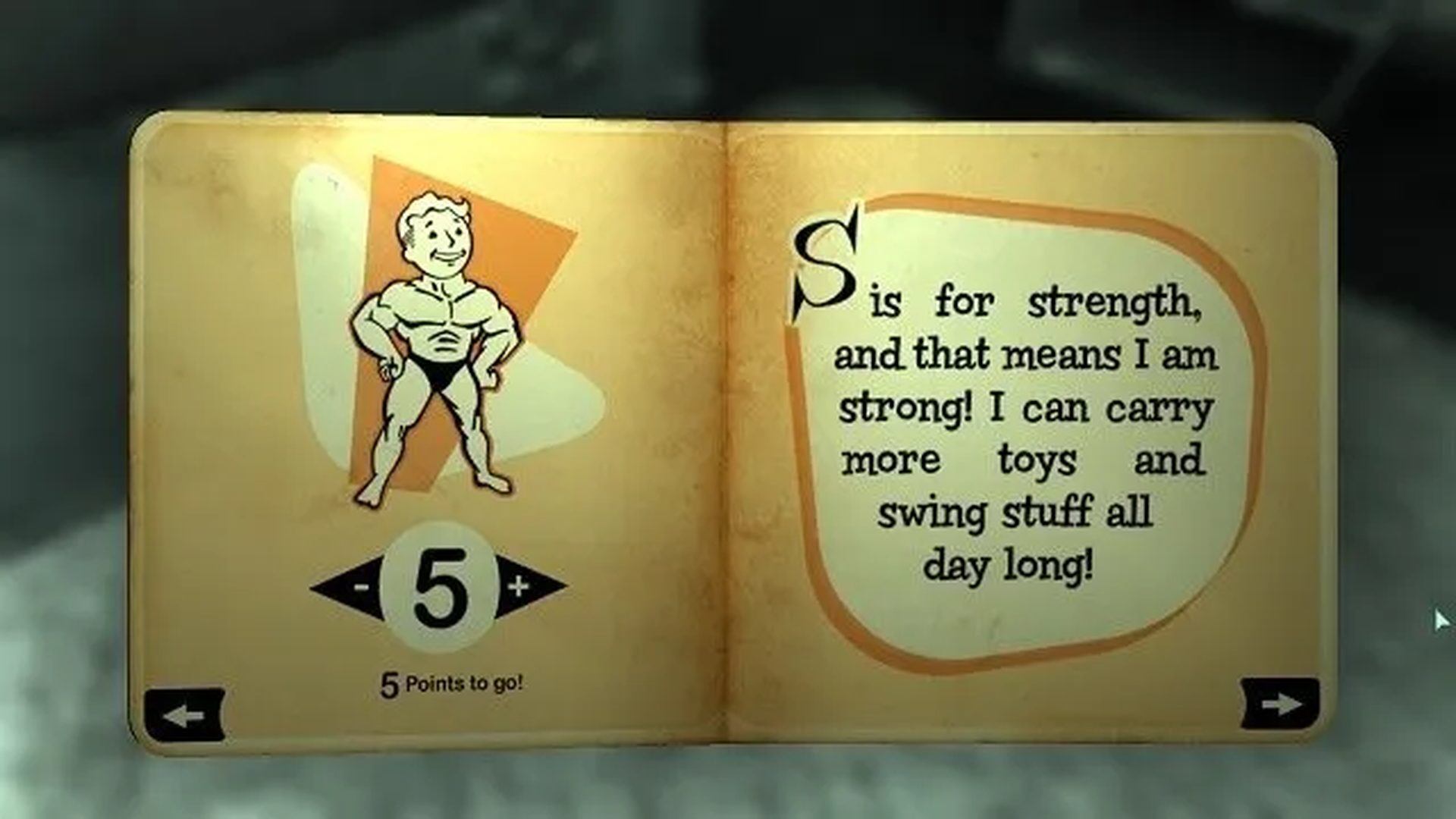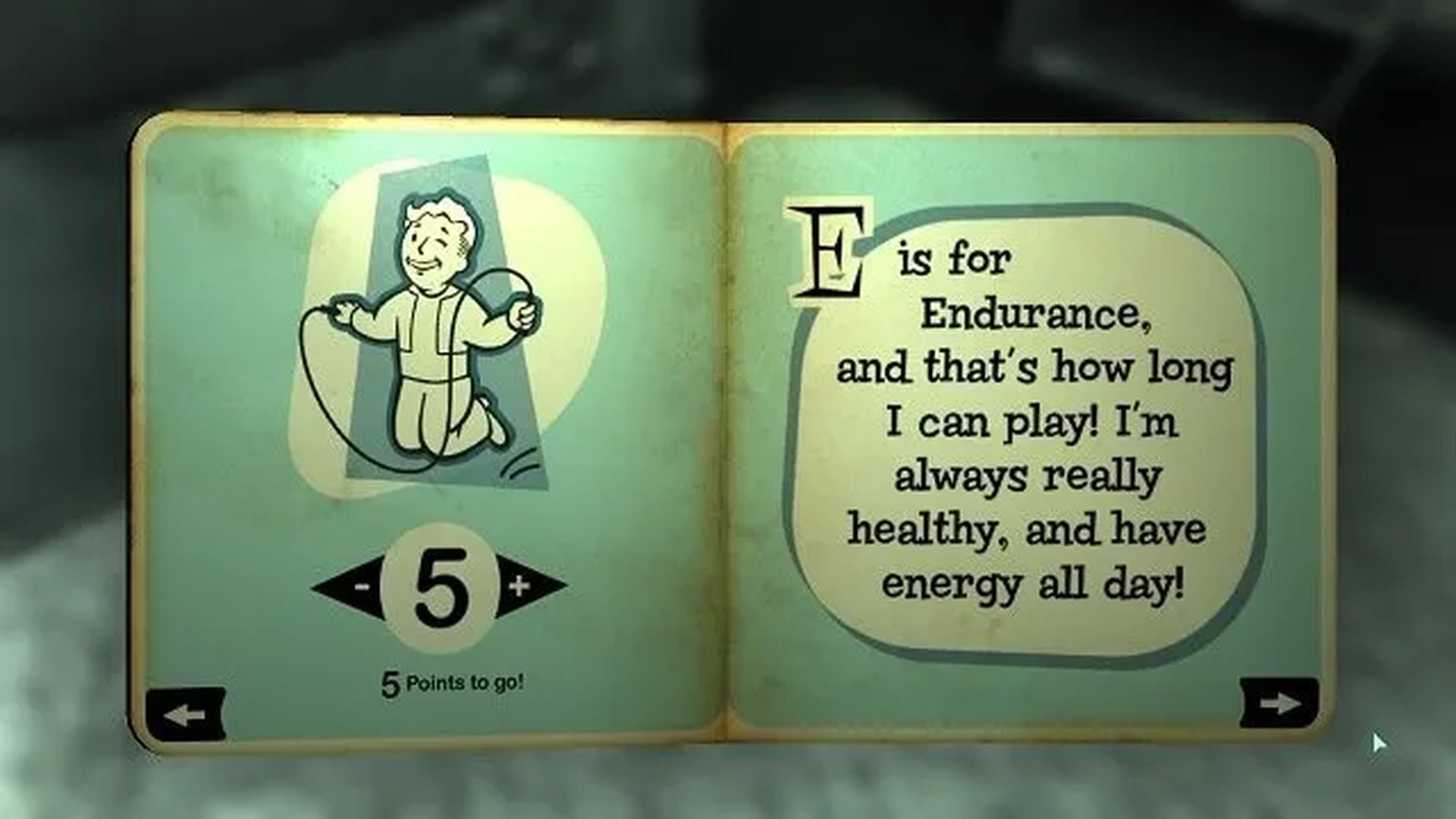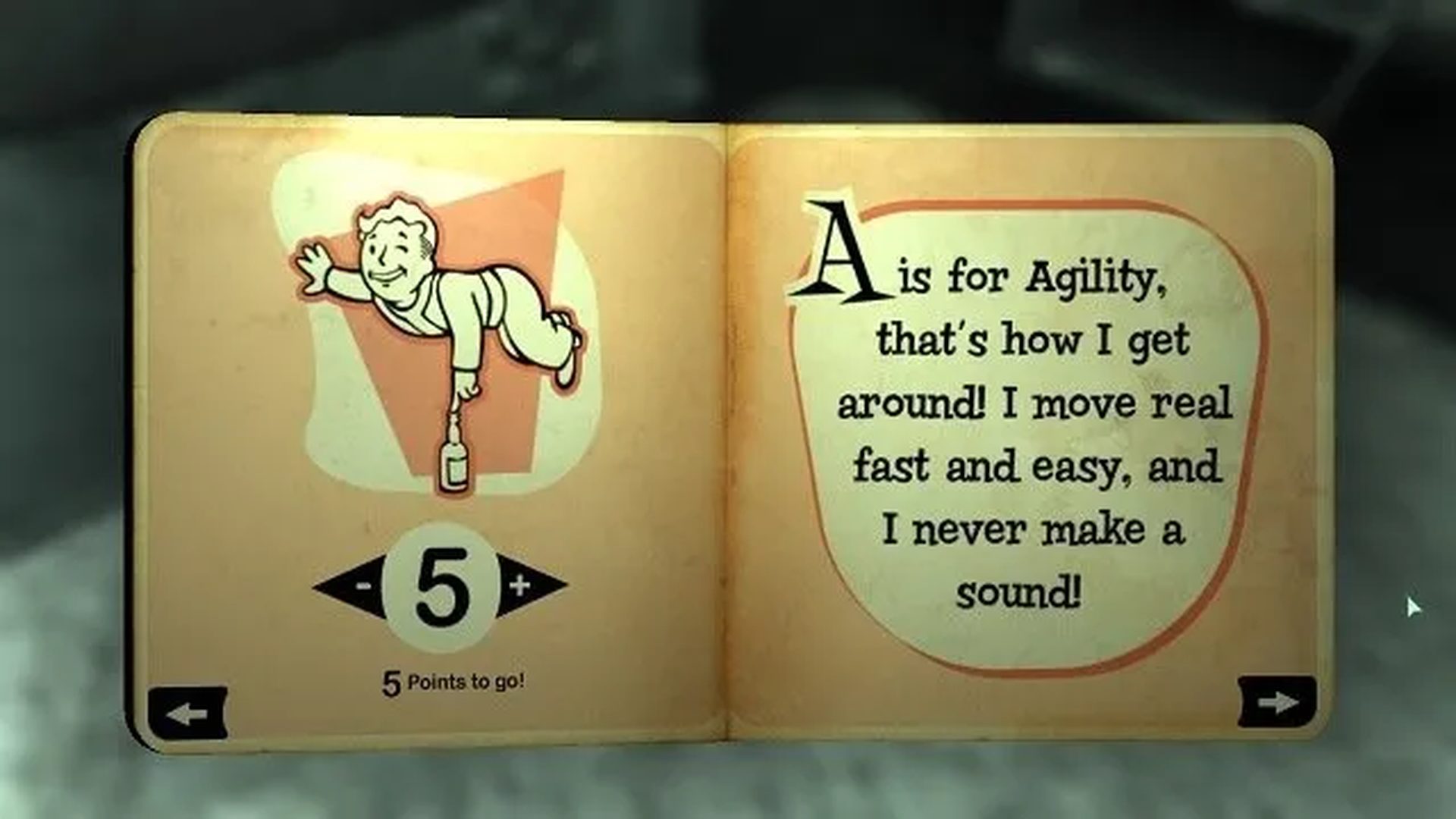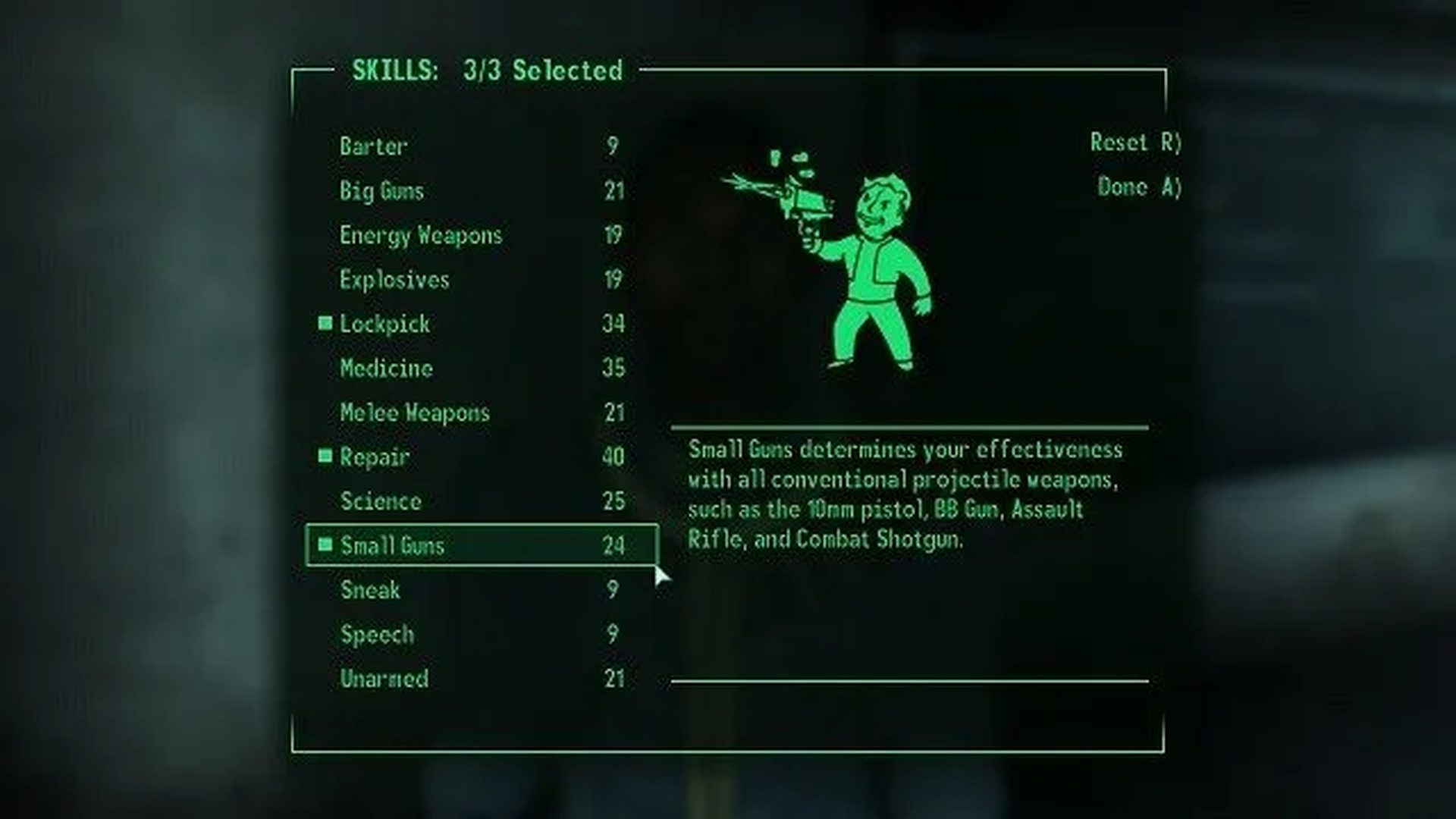Are you looking for the best Fallout 3 starting stats? You came to the right place. The ideal SPECIAL (S.P.E.C.I.A.L.) stats and starting skills for your desired build in Fallout 3 will be covered in this tutorial, which will help you navigate the difficult Capital Wasteland.
With the appropriate Fallout 3 start, you’ll be more prepared to manage the hazards you’ll encounter as you make your journey from Vault 101 to save the world around you. Regardless of your character’s final Fallout 3 perfect build in the end game, most of these initial decisions will depend on your desired build path and roleplaying through the Fallout 3 tale. Each decision point is detailed below to give you the essential knowledge.
Fallout 3’s SPECIAL and abilities systems, like those in the preceding Fallout role-playing games in the series, let you create the perfect character for battle, quests, and NPC encounters. Fallout 3 introduces barter, big guns, energy weapons, explosives, lockpick, medical, melee weapons, repair, science, small guns, sneak, speech, and unarmed, although the SPECIAL system has remained mostly unaltered.

In Fallout 3, your skills influence how effectively you perform specific tasks and can significantly impact the roleplaying and narrative pathways you can take. Each talent has a SPECIAL stat associated with it that determines its starting value. Players can also tag three skills after passing the G.O.A.T. exam in Vault 101 to give them an extra 15 points at the start of their adventure. When your character level increases, you can spend at least 10 points to develop these skills further, and the amount you can spend will depend on your perks and intelligence score.
Additionally, players can find certain bobbleheads or skill books that correspond to specific perks for an additional permanent boost up to level 100. Similar to SPECIAL equipment, other items can also temporarily improve the available skills.
By the time you hit the level cap in Fallout 3, it is relatively simple to max out all of your talents if you are a diligent player and acquire as many skill books and corresponding skill bobbleheads as you can. Because of this, your first emphasis and skill selection in Fallout 3 will be more influenced by your early-game requirements than by your final end-game construct.
Fallout 3 starting stats explained: How to choose it?
In the Fallout franchise, the fundamental SPECIAL system has not changed, and players continue to make decisions based on their strength, perception, endurance, charisma, intelligence, agility, and luck.
After engaging with the “You’re SPECIAL” book as a young child in Vault 101, SPECIAL in Fallout 3 is assigned. You have a total of 40 points to distribute any way you see fit among the seven special statistics, with a minimum value of 1 and a maximum value of 10. After making this choice, players have few choices for increasing their SPECIAL. The only way to do so permanently is to find the corresponding bobbleheads in the environment or to choose particular Fallout 3 perks.
It is often advised to collect the bobblehead to reach 10 rather than starting at 10 for a SPECIAL stat, given the availability of bobbleheads. Additionally, equipment like Fallout 3 armor, clothes, headpiece, and consumables can provide temporary boosts to SPECIAL stats.

Players should focus on how the SPECIAL stat boosts their desired build when determining which Fallout 3 special is ideal for them. In Fallout 3, SPECIAL controls various derivations, including carrying weight, the level of your starting skills, and the perks you can unlock as you level up. Because of all the factors that are covered in the best SPECIAL build guide below, your SPECIAL choice is frequently directly related to your planned build and playstyle.
So, let’s take a closer look at them.
Strength
In Fallout 3, strength largely increases melee damage and carry weight, with a slight boost to melee weapon skill. You should consider this while choosing your starting stats because, in addition to the customary bobblehead for SPECIALs, players can get an early boost to strength through a quest (option of strength or perception).

Accordingly, you should aim for the higher ends of this SPECIAL stat if melee combat is your ultimate goal in battle. For other builds, you’ll probably still need to make an investment to make sure you have enough carry weight for the supplies and loot you’ll pick up along the trip.
The following notable perks (both in-game and DLC) have strength requirements:
- Iron Fist (4 STR) – Boosts unarmed damage
- Strong Back (5 STR) – 50 additional carry weight
Recommended strength level (after bobbleheads):
- 4 minimum for unarmed builds (acquire Iron Fist)
- 10 for melee builds (boost melee weapon damage)
- 1 to 5 for other builds (5 allows you to obtain a strong back)
Perception
The next Fallout 3 starting stats is perception. In V.A.T.S, perception assists players in spotting enemies from a greater distance and slightly improves their proficiency with energy weapons, explosives, and lockpicking.

In general, if you play a lot of V.A.T.S., you’ll need at least 6 to get the sniper perk, as extra does not significantly improve your ability to identify foes, making it worthwhile to spend the money. Given that critical damage significantly impacts overall damage output, most other builds will likewise desire 6 after bobbleheads—unless you are constructing a low luck (which also means low critical chance) build.
The following notable benefits (both in-game and DLC) have perception requirements:
- Sniper (6 PER) – Increases chance for headshots in V.A.T.S.
- Light Step (6 PER) – No longer trigger floor traps
- Better Criticals (6 PER) – Increases critical damage by 50% f
Recommended perception level (after bobbleheads):
- 1 for builds that don’t use V.A.T.S. and don’t build for critical chance (e.g., low SPECIAL luck)
- 6 minimum for all other characters
Endurance
In Fallout 3, endurance increases your hit points, radiation, poison resistance, and your capacity to maintain underwater breath-holding. Big firearms and unarmed skills are also impacted by endurance.

Most players will seek to strike a balance between endurance that provides them with sufficient health for their playstyle without sacrificing other SPECIAL options. This translates to higher values for close-quarters combat, unarmed combat, and melee weapon builds, while users of long-range rifles can choose a lower value. A strong back is unlocked at 5, which is a crucial cutoff point and a balanced approach to this stat.
In-game and DLC notable benefits with endurance requirements include:
- Strong Back (5 END) – 50 additional carry weight
- Toughness (5 END) – Boosts damage resistance
- Life Giver (6 END) – Increases hit points
- Solar Powered (7 END) – Boosts strength and provides health regeneration during day hours
Recommended endurance level (after bobbleheads):
- 5 for most character builds to provide a foundation of health and access strong back perk to help manage loot
- 5 or more for melee or unarmed builds that want some additional durability or to unlock specific perks
Charisma
In Fallout 3, charisma affects how NPCs behave, making it more likely that your conversation checks will be successful. Additionally, charisma slightly improves one’s ability to speak and barter.

Players should make a sizable investment in this if they plan to roleplay a certain character with any of the special bonuses or expect to talk themselves out of situations. Though this can be a way to gain points for other SPECIAL stats if talking through issues in Fallout 3 is not your intended playstyle.
The following notable perks (both base game and DLC) have charisma requirements:
- Master Trader (6 CHR) – 25% reduction in prices of all merchants
Recommended charisma level (after bobbleheads):
- Unless you’re playing a speech-based character in a role-playing game, 1 is where the most player builds should start (this will rise to 2 after bobblehead is acquired)
Intelligence
The best Fallout 3 SPECIAL is intelligence because it affects how many skill points you’ll get with each level up and how powerful your character becomes as a result. This makes it much easier to maximize your core skills, and if combined with other resources, it may even be possible to max every skill in Fallout 3 for the ideal character. Science, medicine, and repair abilities are all influenced by intelligence.

To rush the intelligence bobblehead in Rivet City without gaining any experience, players frequently start Fallout 3 with 9 intellects (other than the experience gained for leaving Vault 101, which makes you level 2). It is difficult to suggest anything lower than 9 intelligence considering the enormous boost it offers, even if you don’t intend to get to this area. Given the advantageous benefits, I advise a minimum of 4 if you want to roleplay as a character with lower intelligence.
For both the original game and DLC, notable perks with intelligence requirements are:
- Comprehension (4 INT) – Gain 2 skill points instead of 1 from skill books
- Educated (4 INT) – Earn 3 extra skill points when you level up
- Warmonger (7 INT) – Build custom weapons without knowing the schematics
Recommended intelligence level (after bobbleheads):
- Most players must reach level 10 to access the advantages of skill points.
- For Fallout 3 players looking for a different option from high intelligence builds, at least 4.
Agility
In Fallout 3, agility increases your action points that can be used for V.A.T.S. activities as well as your ability to use small arms and sneak tactics.

A large investment in agility makes sense for playstyles that emphasize V.A.T.S. because you’ll be able to deliver more attacks before your action points run out. Additionally, this investment gives access to other crucial advantages for this playstyle, such as increases in hit chance, a larger action point pool, or action point regeneration. For stealth-based builds, a significant investment in agility is also necessary to enhance your capacity to move stealthily while using the relevant perk.
For both the original game and DLC, notable perks with agility requirements are:
- Silent Running (6 AGI) – Players can now run without penalties to sneak and gain +10 sneak skill
- Sniper (6 AGI) – Increases chance for headshots in V.A.T.S.
- Light Step (6 AGI) – No longer trigger floor traps
- Action Boy/Girl (6 AGI) – Boosts your action points by 25
- Nerves of Steel (7 AGI) – Improves the regeneration rate of action points
Recommended agility level (after bobbleheads):
- 6 minimum for stealth-focused builds to access silent running
- 7 to 10 for builds that rely on V.A.T.S. for combat power
- 1 for other builds that don’t want to access any agility perks
Luck
The final SPECIAL in the Fallout universe is also one of the most crucial because it increases the critical chance, which is a solid way to increase damage in battle. Additionally, luck alters all skills with every two points spent (increases on odd numbers). Luck is one of the best Fallout 3 starting stats, and probably in real life too.

When playing Fallout 3, most players will desire a healthy amount of luck because it will increase your critical chance when using various weapons, which is a powerful source of damage. Additionally, players have access to vital boosting perks, V.A.T.S. improvements, and perks to increase their capacity for loot investment.
The following notable perks (both in-game and DLC) have luck requirements:
- Fortune Finder (5 LUK) – Find extra bottle caps in containers
- Scrounger (5 LUK) – Find extra ammo in containers
- Mysterious Stranger (6 LUK) – Activates a helper in V.A.T.S. to occasionally kill your enemies
- Better Criticals (6 LUK) – Increases critical damage by 50% for critical hits
Recommended luck level (after bobbleheads):
- 6 minimum to be able to access critical boosting perks but players should seek to push this as high as possible depending on their other SPECIAL needs .
These are the best Fallout 3 starting stats. Are you a Fallout 3 fan? Check out our other guides:
- Fallout 3 GOAT Exam best answers
- How to fix Fallout 3 not launching? (Fallout 3 crashes on startup)
- Fallout 3 crashes on startup: How to fix it (5 easy methods)?
Best Fallout 3 starting skills
After finishing the G.O.A.T. in Fallout 3, there are many factors to consider while choosing which initial talents to tag. The importance of a skill during your first foray into the Wasteland should precede over tagging a skill you want to center your character’s development around. For instance, you might want to specialize in energy weapons, but these weapons and the ammo that goes with them are quite uncommon early on, so these skill points will probably not be used very successfully.

In order to build a well-rounded character, players should restrict the overlap of their talents. When leaving, players should specialize in three types of weaponry. For instance, Vault 101 is probably not the greatest choice. This is because you lack crucial support abilities that would have allowed you to be more flexible in the Wasteland. You might be able to effectively fix your own equipment, pick locks to find the hidden treasure, or talk your way out of a sticky situation using only speech.
Given the foregoing, the following will probably be the best beginning talents for players in Fallout 3:
- Small Guns: The only combat-focused skill in the Fallout 3 universe that is worth tagging is improving your proficiency with standard firearms. The prevalence and potency of this weapon type early on will significantly ease your early game, even if you plan to play as a different build later (such as melee, unarmed, or energy weapons).
- Repair: Because tools and weapons deteriorate quickly with use, having a higher initial repair skill will allow you to combine like items more effectively. Better-maintained equipment will both increase your ability to damage enemies and protect you from harm.
- Lockpick: Early on in the game, you’ll need some skill points in lockpick because extra loot frequently hides behind locked doors or safes. Additionally, having a strong lockpick starting position will help the player keep up with the increasingly difficult locks as the story progresses.
Other outstanding choices for the greatest Fallout 3 skills to take into account are:
- Science: By hacking terminals, players can gain access to locations and the related loot. This is similar to lockpicking. Keep in mind that most of the time, and especially in the early game, you can use a lockpick or science to access major loot. Science can occasionally be more useful than lockpicking, for example, by being able to penetrate a security system. Lockpicking can be replaced with science if you prefer it because the two skills overlap.
- Medicine: As you will be healing from items frequently in the early game, medicine can help you save some caps currency since you’ll be using fewer stimpaks overall. In most cases, however, you’ll already have a fairly high level in this skill, given the high intelligence focus in almost all Fallout 3 builds and the ability to obtain the medicine bobblehead before you leave Vault 101.
- Speech: An early improvement in speech might allow players to complete a task without any obstacles, or it can increase your quest prize to help you get off to a better start in the difficult Wasteland. If this character appeals to you, replace this with repair from the aforementioned suggestions to offer a new kind of utility.





